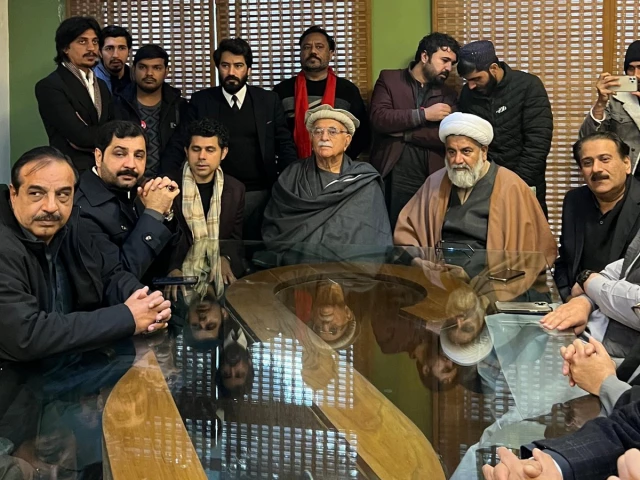- Afghanistan’s Unfinished War – OpEd Eurasia Review
- The Islamic State Khorasan Province (ISKP)-Lashkar-e-Taiba (LeT) Nexus Under Pakistan’s Patronage MEMRI | Middle East Media Research Institute
- Cross-Border Terrorism Persists Pakistan Today
Category: 1. Pakistan
-
Afghanistan’s Unfinished War – OpEd – Eurasia Review
-

Owaisi’s ‘hijabi PM’ pitch draws sharp criticism | India News
PATNA: BJP-led NDA hit out at AIMIM chief Asaduddin Owaisi over his remarks that a hijab-clad woman would one day become Prime Minister, triggering a sharp exchange over Constitution, religion and political power Saturday, reports Jai Narain…
Continue Reading
-

CM orders timely completion of agri development projects
Work on 25 gates underway at Sukkur Barrage as CM directs replacement of all 27 gates within stipulated timeframe
…Continue Reading
-

The bombs in Afghanistan have stopped but its people now live under Taliban decrees
Four years after the Taliban’s return to power security is no longer the defining issue in Afghanistan. Instead, one of the world’s worst humanitarian crises is exacerbated by a series of overlapping disasters.
It’s a Thursday afternoon in Kabul,…
Continue Reading
-

Watched, scared and trapped in an Australian visa nightmare, Kiran is one of India’s ‘abandoned brides’ | Queensland
Kiran’s* husband was more than 10,000km away from the home she shared with her in-laws in a village in northern India. But despite the vast distance, he watched her constantly through cameras which beamed into a screen in his Brisbane home.
Continue Reading
-

TTAP warns army against political role, calls for nationwide protest on Feb 8
Says no country can function without army and intelligence, but their mandate is limited to the Constitution
Mahmood Khan Achakzai and Allama Raja Nasir Abbas Jafri received a warm welcome at the South Asian Media University by leaders of…
Continue Reading
-
DPM arrives at OIC Secretariat to attend OIC CFM session – RADIO PAKISTAN
- DPM arrives at OIC Secretariat to attend OIC CFM session RADIO PAKISTAN
- FM Dar to head to Saudi Arabia for extraordinary meeting of OIC Council of Foreign Ministers Dawn
- Dar to attend OIC moot on Somaliland The Express Tribune
- DPM Dar reaches…
Continue Reading
-

Peshawar’s Chitral Bazaar sees winter boom in traditional woollen caps
Every winter, trade picks up in Peshawar’s historic Chitral Bazaar as demand rises for traditional woollen clothing from Pakistan’s mountainous northwest. Founded in the late 1940s by traders from Upper Chitral, the bazaar is known nationwide…
Continue Reading
-

VIDEO: Pakistan Citrus Festival inaugural day sees large turnout at Al Wakrah Old Souq
The Pakistan Citrus Festival at Al Wakrah Old Souq on January 10, 2026. ( Photos by Mahmoud Elmazaty / The Peninsula)
Doha, Qatar: The inaugural edition of the Pakistan Citrus Festival kicked off on Saturday at Al Wakrah Old Souq,…
Continue Reading
-
President, PM felicitate Pakistan Navy for successful North Arabian Sea exercise – RADIO PAKISTAN
- President, PM felicitate Pakistan Navy for successful North Arabian Sea exercise RADIO PAKISTAN
- Pakistan Navy successfully tests surface-to-air-missile at sea Dawn
- Pakistan Navy tests LY-80 missile, drones and unmanned vessel in Arabian Sea The…
Continue Reading